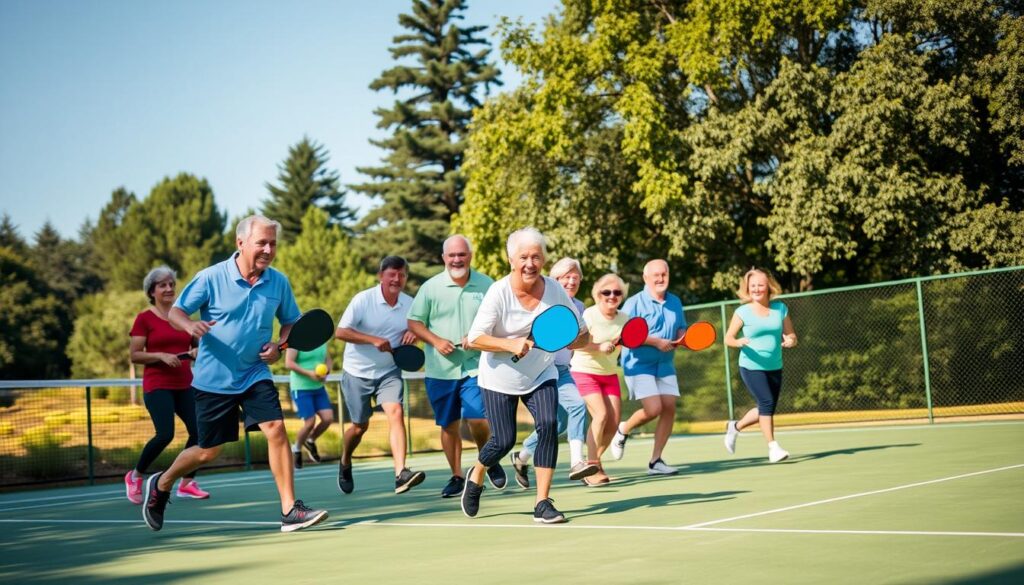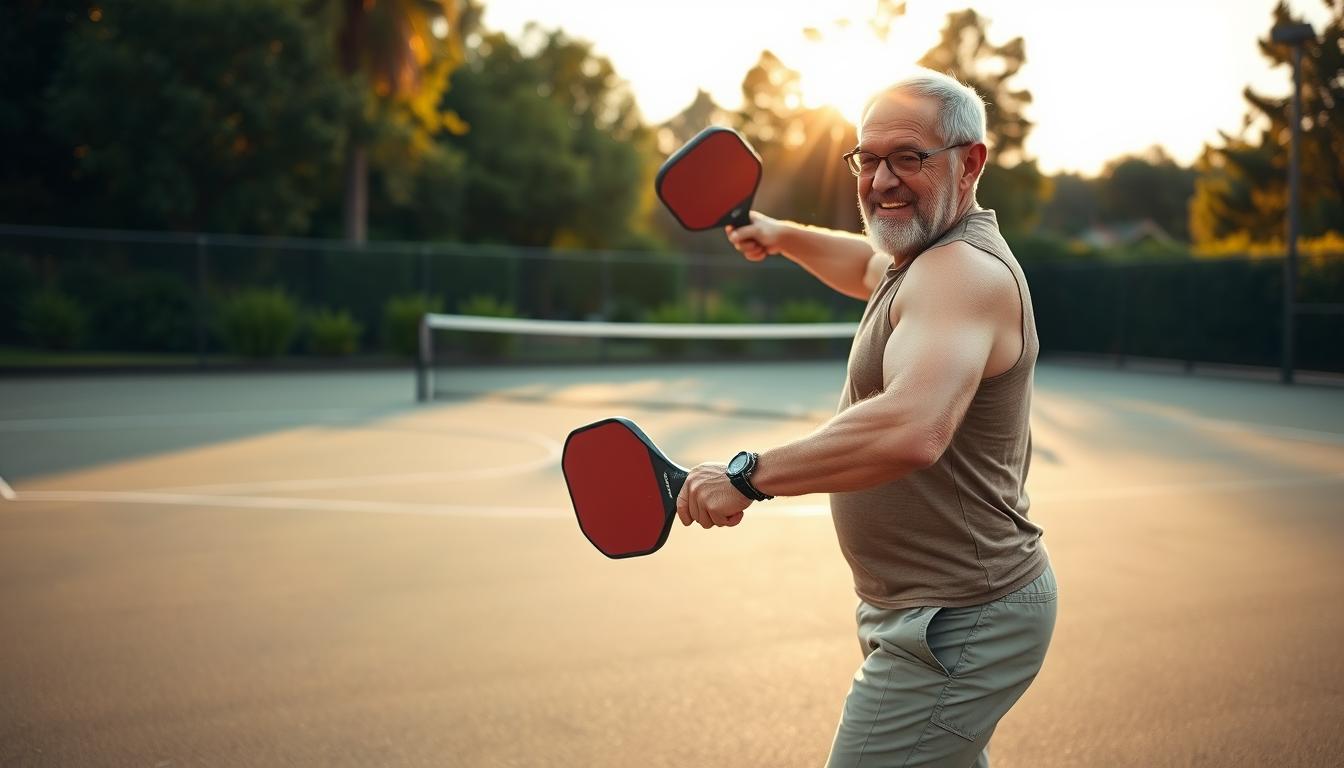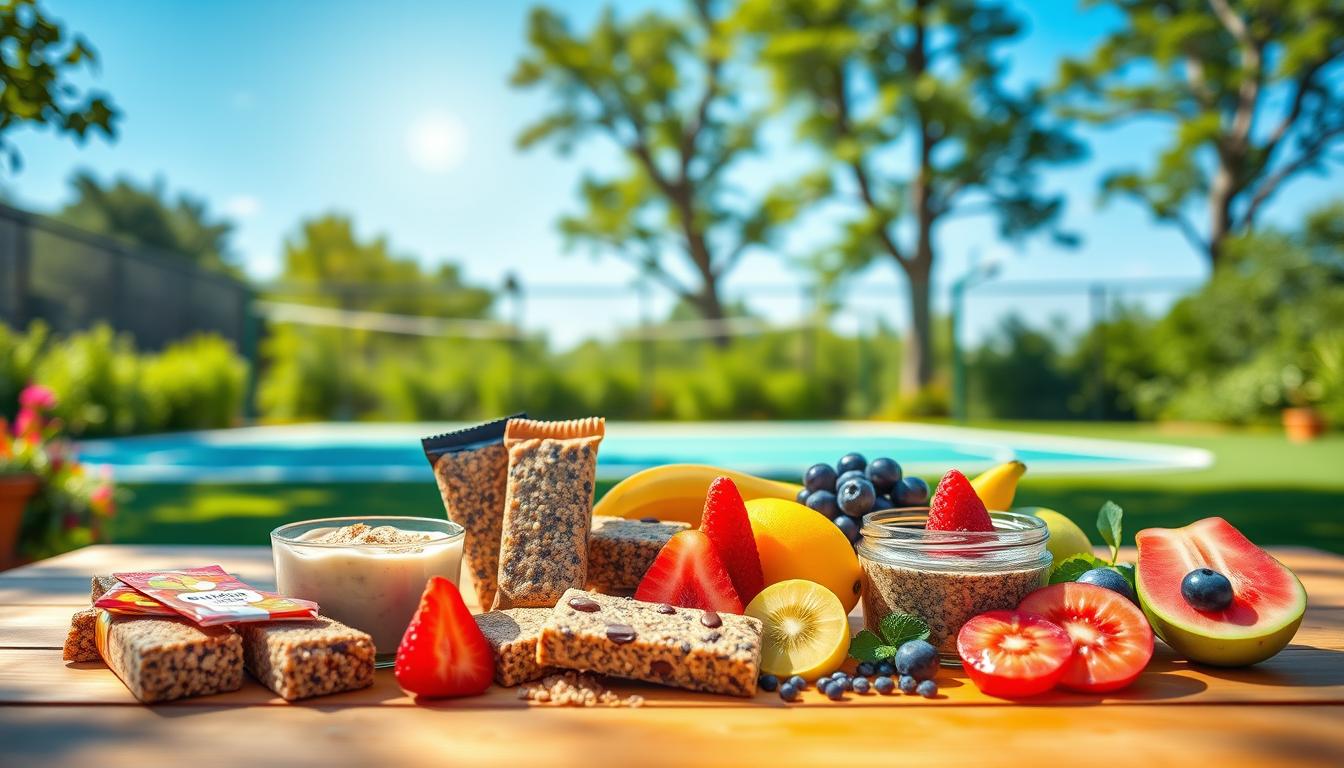Ever thought about how your diet could boost your pickleball recovery and performance? A healthy rest day is key, especially with a vegan diet that meets your nutritional needs. We’ll dive into recovery tips that support your active life and fit a plant-based diet. This way, you’ll get the most out of your downtime.
Understanding the Importance of Rest Days
Rest days are crucial for staying active, especially for those over 50. They help the body recover from exercise. This is important as we age, as it helps us recharge and feel less tired.
Rest days also boost physical health. Without them, we risk getting hurt and struggling to stay active. It’s important to listen to your body and take rest when needed. This way, you can recover faster and perform better in your workouts.

Having a balance of rest and activity is key for lasting fitness and health. By planning rest days, you can stay motivated and see better results in your active lifestyle.
Benefits of Pickleball for Adults in Their 50s
Pickleball is a great sport for adults over 50. It’s fun and social, making it perfect for staying active. It’s low-impact and helps improve skills, fitting all fitness levels.
Playing pickleball boosts heart health, keeping energy up for daily tasks. It also improves balance and coordination, which can decline with age. This sport helps keep muscles and bones strong, preventing age-related loss.
But pickleball does more than just keep you fit. It’s also good for your mind. Playing with others helps you make friends and share fun moments. This can really boost your mood and emotional health.

Why Choose a Vegan Diet at This Stage of Life
Choosing a vegan diet has many benefits for adults over 50. It meets their health and nutrition needs well. As we age, our bodies need different things, making the right diet very important.
Health Benefits of a Plant-Based Diet
A vegan diet is great for older adults. It can lower the risk of heart disease, high blood pressure, and diabetes. Eating whole foods like fruits, veggies, and grains helps manage weight and cuts down on bad fats.
This diet is good for the heart by keeping cholesterol levels in check. It also improves blood flow. Plus, it might help keep the mind sharp and lower dementia risk.
Addressing Nutritional Needs
Nutritional needs change with age, especially for active adults over 50. A vegan diet must provide all necessary nutrients without harming health. Foods like legumes, nuts, seeds, and fortified plant milks are good sources.
Planning meals to include a variety of foods is key. This ensures you get all the nutrients you need. It also lets you enjoy the many health benefits of a vegan diet.
Vegan Rest Day Tips for 50+ Players
Effective vegan rest day tips can greatly help players over 50 recover. Drinking plenty of water is key. It helps the body heal and get ready for the next day of pickleball.
Keeping an eye on how much water you drink is important. It helps you recover better, especially after a busy day.
Prioritize Recovery and Hydration
Don’t forget about hydration on rest days. Drinking enough water helps you perform better. Players should drink water all day and eat foods that are full of water, like cucumbers and oranges.
These foods also give you important vitamins and minerals. They help you recover faster.
Focus on Nutrient-Dense Meals
Choose meals that are full of nutrients. Look for foods with carbs, proteins, and healthy fats. Legumes, whole grains, nuts, and seeds are great for muscle recovery.
Eating a variety of colorful vegetables and fruits is also key. They give you the vitamins and minerals you need for health and recovery.
Essential Nutrients for Active Individuals Over 50
Knowing about essential nutrients is key for staying active, especially for those over 50. As we age, our bodies need different things. This includes more protein, vitamins, and minerals for health and happiness.
Importance of Protein Intake
Protein is vital for keeping muscles strong and fixing them when needed. It’s crucial for older adults who are active. They should eat about 1.2 to 1.4 grams of protein for every kilogram of their body weight.
This helps keep muscles healthy and helps them recover. It meets the dietary needs that come with getting older.
Vitamins and Minerals to Consider
Active people over 50 need certain vitamins and minerals for their health. Important ones include:
- Vitamin B12: It’s good for nerve health and keeping the mind sharp.
- Vitamin D: It helps the body absorb calcium and keeps bones strong.
- Calcium: It’s important for strong bones and lessens the chance of fractures.
- Iron: It’s essential for energy and staying strong.
Eating foods rich in these nutrients is important. It helps keep you healthy and active as you get older.
Meal Planning for a Vegan Lifestyle
Meal planning is key for those on a vegan diet, especially in their 50s. It helps meet nutritional needs and enjoy a variety of meals. This approach makes vegan living easier and boosts health with plant-based foods.
Strategies for Plant-Based Meal Prep
Good meal prep can make vegan cooking easier. Try cooking several meals at once to save time. This way, you can try new recipes with less effort.
Use tools like the Forks Over Knives meal planner to organize your meals. This helps reduce stress about what to eat. Also, mix up your ingredients to keep meals exciting and nutritious.
Creating Balanced Meals
To make meals both healthy and tasty, aim for balance. Include protein, carbs, fats, and vitamins in every dish. This supports your health and makes meals more enjoyable.
For example, a quinoa salad with beans, veggies, and nuts is a great choice. It shows how versatile plant-based meals can be.
| Meal Type | Ingredients | Nutrition Focus |
|---|---|---|
| Breakfast | Overnight oats with almond milk, chia seeds, and berries | Fiber, antioxidants, healthy fats |
| Lunch | Chickpea salad with olive oil, lemon, and mixed greens | Protein, healthy fats, vitamins A and C |
| Dinner | Stir-fried tofu with broccoli, bell peppers, and brown rice | Protein, carbohydrates, vitamins K and C |
Incorporating Whole Foods Into Your Diet
Adding whole foods to your diet is great for recovery. They are not heavily processed, so they keep more of their natural nutrients. Foods like fruits, veggies, nuts, seeds, and grains give you the vitamins and minerals you need for good health.
Types of Whole Foods to Include
- Dark leafy greens: Spinach, kale, and Swiss chard are excellent sources of iron and calcium.
- Whole grains: Quinoa, brown rice, and oats provide complex carbohydrates that fuel physical activity.
- Legumes: Black beans, lentils, and chickpeas are rich in protein and fiber, supporting muscle repair and digestive health.
- Fruits: Berries, oranges, and bananas are packed with antioxidants, boosting the immune system.
- Nuts and seeds: Almonds, chia seeds, and walnuts supply healthy fats that help with inflammation and recovery.
Benefits of Whole Foods for Recovery
Whole foods are key for recovery, offering meals full of nutrients. They help repair muscles and refill energy after working out. Foods rich in fiber also support gut health, which is crucial for absorbing nutrients.
By eating a variety of whole foods, you get all the nutrients you need. This balance is essential for top performance and overall health.
Healthy Snacks to Enjoy on Rest Days
Rest days are key for recovery. Choosing the right snacks can boost your energy. Snacks that are vegan and high in protein are great for recovery. Here are some snack ideas to keep you fueled.
Snack Ideas Rich in Protein
Protein is vital on rest days for muscle repair and growth. Here are some vegan protein-rich snack options:
- Edamame sprinkled with sea salt
- Homemade energy bars made from dates, nuts, and seeds
- Nut butter paired with apple or banana slices
- Chickpea salad on whole grain crackers
- Vegan protein smoothies made with almond milk and various fruits
Refreshing Hydration Options
Drinking enough water is as important as eating well. Here are some refreshing drinks to stay hydrated:
- Infused water with slices of lemon, lime, or cucumber
- Coconut water for a natural electrolyte boost
- Smoothies infused with leafy greens and a base of almond or oat milk
Mindfulness and Mental Health on Rest Days
Mindfulness is key on rest days for both mental and physical health. Activities like meditation or gentle yoga help us tune into our bodies. This can lead to better recovery.
Leisurely walks in nature also help. They reduce stress and calm the mind before we get back to pickleball.
The Connection Between Mind and Body
The mind and body are closely linked, affecting our health. Mindfulness helps with emotional control and physical healing. It keeps us calm and focused for better sports performance.
Stress Relief Techniques for 50+ Players
Stress relief is crucial for mental health. Techniques like deep breathing, light stretching, or hobbies are great. They ease physical tension and boost emotional strength, important for those over 50.
Using mindfulness on rest days helps with both physical and mental recovery. It ensures players are well-rounded and ready for their next match.
Exploring Alternative Activities on Rest Days
Doing different activities on rest days helps your body recover while staying active. Gentle exercises boost blood flow and improve flexibility. This is key for playing pickleball well. Adding these activities to your routine helps your body and mind, getting you ready for the next game.
Stretching and Yoga for Flexibility
Stretching or yoga on rest days boosts flexibility and relaxes you. These practices help loosen tight muscles and improve movement. Regular stretching helps your muscles recover and prevents stiffness, keeping you ready for pickleball.
Low-Impact Exercises to Stay Active
Choosing low-impact activities like swimming, walking, or cycling is great for staying active without too much strain. These exercises are good for your heart and help keep muscles strong, especially for older people. Doing low-impact exercises is a fun way to stay fit on rest days.
Listening to Your Body: How to Know When to Rest
It’s key to listen to your body, especially when playing sports like pickleball. Knowing when you’re tired helps you take breaks and recover well.
Signs You Need to Take a Break
Here are some signs you might need to rest:
- Prolonged fatigue that doesn’t get better with rest.
- Feeling more irritable or emotional than usual.
- Having aches or pains that don’t go away after you’ve stopped playing.
- Not wanting to do physical activities anymore, which might mean you’re burned out.
Rest Interval Recommendations
It’s important to take breaks to help your muscles recover. Here’s what you can do:
- Make sure to have at least one full rest day each week.
- Do lighter activities on other days to keep moving without getting too tired.
- Balance how hard you work out and how much you do with enough time to rest, so you can keep exercising without getting too worn out.
Community and Socializing on Your Rest Day
Rest days are a great chance to connect with others, especially in the pickleball world. Talking with fellow players can make you feel better and keep you motivated. It helps you stay excited about playing pickleball.
Engaging with Fellow Pickleball Players
Going to community events or playing pickleball with friends is a great way to meet people. It’s good for your mood and helps you stay active. Joining a tournament or playing a casual game can make you love the game even more.
Finding Exciting Vegan Groups and Events
Rest days are also a good time to find vegan groups and events. You can try new recipes and meet people who like vegan food. It’s a fun way to learn new things and meet like-minded people.
Why Tracking Progress Matters
Tracking progress is key to an active lifestyle. Keeping a food diary and logging physical activities helps understand how diet affects health. This practice leads to better choices, especially for vegans.
Benefits of Keeping a Food and Activity Diary
A food diary makes you aware of your eating and exercise habits. It offers insights for better health monitoring. It ensures you get the right nutrients, keeping energy up on busy days.
How to Monitor Your Progress Effectively
Use apps or journals to track food, exercise, and rest. Regularly checking this info helps spot patterns. This knowledge lets you make diet changes and stay on track with your health goals.
How to Address Nutritional Challenges of a Vegan Diet
Switching to a vegan diet can bring up nutritional challenges. It’s important to know how to get enough essential nutrients. Understanding common issues helps plan a balanced diet.
Common Pitfalls and How to Avoid Them
Not getting enough protein is a big worry. It’s key to mix plant-based proteins to get all amino acids. Also, vitamins like B12, iron, and omega-3s need extra care. Eating too much processed vegan food can also be a problem.
- Incorporate a variety of protein sources, such as lentils, chickpeas, and quinoa.
- Consider fortified foods or supplements for vitamin B12.
- Include flaxseeds and chia seeds for omega-3 fatty acids.
Seeking Professional Guidance from Dietitians
Talking to a registered dietitian is very helpful. They give personalized advice and meal plans. This support is key to meeting all your nutritional needs and living a healthier life.
Conclusion
For adults over 50 playing pickleball, a vegan diet is key. It helps with recovery and boosts overall health. The right food choices can greatly improve performance and life quality as you get older.
Choosing healthy, vegan foods is crucial for an active life. It supports both physical and mental health. This way, you can keep enjoying pickleball and stay connected with your community as you age.
Starting a healthy journey with a vegan diet and smart recovery is a great step. It lays a strong foundation for a long, healthy life, both in sports and daily activities.




